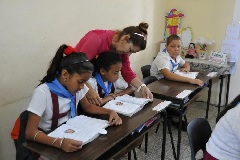Control gubernamental: Una propuesta metodológica para la Unidad Presupuesta de Educación del municipio Florida
Palabras clave:
presupuesto del estado, controlResumen
Bajo el supuesto que el presupuesto constituye un medio de control de la ejecución del gasto público, el objetivo del presente trabajo fue proponer un enfoque analítico de control gubernamental para la unidad presupuestada de educación del municipio Florida, Camagüey que tenga presente el principio de caja y el devengo del gasto. El estudio realizado es una investigación de enfoque mixto, transversal, de carácter propositivo, donde se utilizó la técnica de expertos. Como resultado se obtuvo un procedimiento de análisis de la ejecución presupuestaria compuesto por seis componentes donde se definieron los siguientes elementos: Objetivo, estructura de la tabla, y periodicidad. La propuesta metodológica realizada fue sometida a constatación de diez expertos que la evaluaron con rigor científico, valida, objetiva, especifica y factible.
Citas
Albi, E., González-Páramo, J. M., & López, G. (1997). Gestión pública. Barcelona: Editorial Ariel. Barcelona: Ariel.
Cuesta, A. (2005). Tecnología de Gestión de Recursos Humanos. La Habana: Academia.
del Toro, J. (. (2005). Administración Financiera del Estado Cubano. Montevideo: Impreso Prontográfica.
del Toro, J. (2019). Implementación del Sistema de Contabilidad Gubernamental en el sector gobierno en Cuba. (Tesis Doctoral). La Habana: Universidad de la Habana.
Fernández, A. (1998). Enfoque analítico gubernamental para medir eficiencia y eficacia de las empresas públicas y unidades presupuestadas”. [Tesis Doctoral]. . Camaguey: Universidad Ignacio Agramonte.
Las Heras, J. .. (2010). Estado eficiente. Administración financiera gubernamental. Un enfoque sistémico 3a. Ed. . México: Osmar Buyatti Editorial.
Morales, M. (2013). “Bases metodológicas de la Contabilidad Gubernamental en el sector gobierno a nivel municipal”. [Tesis Doctoral]. Camagüey : Universidad Ignacio Agramonte Loynaz.
Neumark, J. (1976). Teoría y práctica de la técnica presupuestaria Tomo I. . Madrid: Instituto de Estudios Fiscales.
Nieto, J. (1991). Presupuesto de gastos fiscales en España. . Madrid: Instituto de Estudios Fiscales.
Parker, L. D. (1990). The Public Sector: Contemporary Readdings in Accounting and Auditing. . Sidney: Harcourt Brace Jovanovich. .
Rodríguez, H., & Fernández, A. &. (2015). Análisis del presupuesto de las universidades: un nuevo enfoque. COFIN HABANA, 9(1), 1-10.
Sarduy, M. (2013). Apuntes sobre administración financiera gubernamental. . La Habana: Felix Varela.

Descargas
Publicado
Cómo citar
Número
Sección
Licencia

Esta obra está bajo una licencia internacional Creative Commons Atribución-NoComercial-SinDerivadas 4.0.
El envío de una contribución a la Revista Cubana de Finanzas y Precios (RCFP) implica una cesión no exclusiva de derechos, que incluye:
- Reproducir el Artículo total o parcialmente y comunicar el Artículo al público en formato impreso o electrónico, combinado o no con obras de terceros, como por ejemplo poniendo el Artículo a disposición del público a través de Internet o de cualquier otra red, como parte de una base de datos, con acceso on-line u off-line, para su utilización por terceros;
- Traducir el Artículo a otros idiomas y difundir al público la traducción;
- Crear adaptaciones, resúmenes o extractos del Artículo y otras obras derivadas del mismo, así como ejercer todos sus derechos sobre dichas adaptaciones, resúmenes, extractos y obras derivadas;
- Incluir el Artículo, ya sea en su versión traducida, adaptada o resumida, total o parcialmente, en una base de datos informatizada y poner ésta a disposición de terceros;
- Incluir el Artículo, total o parcialmente, ya sea en su versión traducida, adaptada o resumida, en una selección o recopilación de textos;
- Alquilar o prestar el Artículo a terceros;
- Reproducir el Artículo por medio de reprografía, sin perjuicio de las limitaciones legales.
El Autor de los artículos publicados en la Revista Cubana de Finanzas y Precios (RCFP) podrá ejercer los siguientes derechos:
- Reproducir el Artículo, total o parcialmente, y difundir su contenido o ponerlo a disposición del público, en formato impreso o electrónico, como parte de un contenido docente o como una recopilación, para su uso en el ámbito académico o de investigación en la institución a la que pertenezca el Autor o en aquellas instituciones a las que este pertenezca.
- Publicar el Artículo en Internet o autorizar a la institución del Autor (o a cualquier otra organización apropiada) a hacer lo propio, de forma inmediata a partir de la fecha de publicación del Artículo en la revista: dentro de la red cerrada de la institución (p. ej., la intranet); o en repositorios institucionales de acceso público o repositorios organizados de forma centralizada, siempre que se incluya un enlace al Artículo en el sitio web de la revista.
- Ceder a la propia institución del Autor (o a cualquier otra organización apropiada) la autorización para reproducir el Artículo con objeto de evitar su deterioro o, si el original estuviera en un formato obsoleto o la tecnología para utilizarlo no estuviese disponible, a fin de asegurar que el Artículo sigue estando disponible para propósitos docentes o de investigación;
- Presentar el Artículo en una reunión o conferencia, y distribuir copias del mismo a los asistentes al evento.
- Ceder a usuarios finales de la propia institución del Autor (o de cualquier otra organización apropiada) la autorización para copiar, utilizar, transmitir y presentar en público el trabajo y para crear y distribuir obras derivadas.



